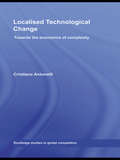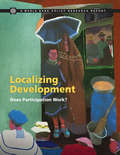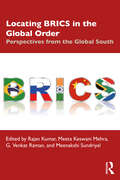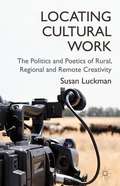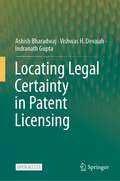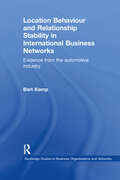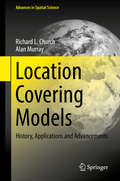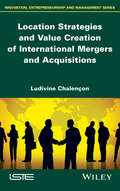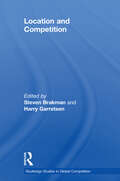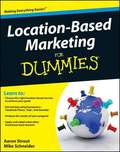- Table View
- List View
Local: The New Face of Food and Farming in America
by Douglas GayetonCombining stunning visuals with insights and a lexicon of more than 200 agricultural terms explained by today’s thought leaders, Local showcases and explores one of the most popular environmental trends: rebuilding local food movements.When Douglas Gayeton took his young daughter to see the salmon run—a favorite pastime growing up in Northern California—he was devastated to find that a combination of urban sprawl, land mismanagement, and pollution had decimated the fish population.The discovery set Gayeton on a journey in search of sustainable solutions. He traveled the country, photographing and learning the new language of sustainability from today’s foremost practitioners in food and farming, including Alice Waters, Wes Jackson, Carl Safina, Temple Grandin, Paul Stamets, Patrick Holden, Barton Seaver, Vandana Shiva, Dr. Elaine Ingham, and Joel Salatin, as well as everyday farmers, fishermen, and dairy producers.Local: The New Face of Food and Farming blends their insights with stunning collage-like information artworks and Gayeton’s Lexicon of Sustainability, which defines and de-mystifies hundreds of terms like “food miles,” “locavore,” “organic,” “grassfed” and “antibiotic free.” In doing so, Gayeton helps people understand what they mean for their lives. He also includes “eco tips” and other information on how the sustainable movement affects us all every day.Local: The New Face of Food and Farming in America educates, engages, and inspires people to pay closer attention to how they eat, what they buy, and where their responsibility begins for creating a healthier, safer food system in America.
Localised Technological Change: Towards the Economics of Complexity (Routledge Studies In Global Competition Ser.)
by Cristiano AntonelliThe extent to which firms can react creatively to rather than adjust passively against new techniques and practices is dependent on their command of technological knowledge and relative competence. This book explores the characteristics of the path dependent dynamics of localized technological change, demonstrating how the economics of complexity c
Localization Strategies for Global E-Business
by Nitish SinghThe acceleration of globalization and the growth of emerging economies present significant opportunities for business expansion. One of the quickest ways to achieve effective international expansion is by leveraging the web, which allows for technological connectivity of global markets and opportunities to compete on a global basis. To systematically engage and thrive in this networked global economy, professionals and students need a new skill set; one that can help them develop, manage, assess and optimize efforts to successfully launch websites for tapping global markets. This book provides a comprehensive, non-technical guide to leveraging website localization strategies for global e-commerce success. It contains a wealth of information and advice, including strategic insights into how international business needs to evolve and adapt in light of the rapid proliferation of the 'Global Internet Economy'. It also features step-by-step guidelines to developing, managing and optimizing international-multilingual websites and insights into cutting-edge web localization strategies.
Localizing Development
by Ghazala Mansuri Vijayendra RaoThe Policy Research Report Localizing Development: Does Participation Work? brings analytical rigor to a field that has been the subject of intense debate and advocacy, and billions of dollars in development aid. It briefly reviews the history of participatory development and argues that its two modalities, community-based development and local decentralization, should be treated under the broader unifying umbrella of local development. It suggests that a distinction between organic participation (endogenous efforts by civic activists to bring about change) and induced participation (large-scale efforts to engineer participation at the local level via projects) is key, and focuses on the challenges of inducing participation. The report provides a conceptual framework for thinking about participatory development and then uses this framework to conduct a comprehensive review of the literature. The framework develops the concept of civil society failure and explains its interaction with government and market failures. It argues that participatory development, which is often viewed as a mechanism for bypassing market and government failures by harnessing civic capacity, ought to be seen instead as a mechanism that, if done right, could help to repair important civil society failures. It distills literature from anthropology, economics, sociology, and political science to outline the challenges for effective policy in this area, looking at issues such as the uncertainty of trajectories of change, the importance of context, the role of elite capture and control, the challenge of collective action, and the role of the state. The review of the evidence looks at a variety of issues: the impact of participatory projects on inclusion, civic capacity, and social cohesion; on key development outcomes, such as income, poverty, and inequality; on public service delivery; and on the quality of local public goods. It draws on the evidence to suggest several recommendations for policy, emphasizing the key role of learning-by-doing. It then reviews participatory projects funded by the World Bank and finds the majority lacking in several arenas – particularly in paying attention to context and in creating effective monitoring and evaluation systems that allow for learning.
Localizing Global Finance: The Rise of Western-Style Private Equity in China
by Justin RobertsonLocalizing Global Finance illustrates that private equity has become a more significant component of China's economy based on a pattern of new domestic elites importing and implementing a largely Western financial model.
Locally Laid: How We Built a Plucky, Industry-changing Egg Farm - from Scratch
by Lucie B. AmundsenHow a Midwestern family with no agriculture experience went from a few backyard chickens to a full-fledged farm--and discovered why local chicks are better.When Lucie Amundsen had a rare night out with her husband, she never imagined what he'd tell her over dinner--that his dream was to quit his office job (with benefits!) and start a commercial-scale pasture-raised egg farm. His entire agricultural experience consisted of raising five backyard hens, none of whom had yet laid a single egg. To create this pastured poultry ranch, the couple scrambles to acquire nearly two thousand chickens--all named Lola. These hens, purchased commercially, arrive bereft of basic chicken-y instincts, such as the evening urge to roost. The newbie farmers also deal with their own shortcomings, making for a failed inspection and intense struggles to keep livestock alive (much less laying) during a brutal winter. But with a heavy dose of humor, they learn to negotiate the highly stressed no-man's-land known as Middle Agriculture. Amundsen sees firsthand how these midsized farms, situated between small-scale operations and mammoth factory farms, are vital to rebuilding America's local food system. With an unexpected passion for this dubious enterprise, Amundsen shares a messy, wry, and entirely educational story of the unforeseen payoffs (and frequent pitfalls) of one couple's ag adventure--and many, many hours spent wrangling chickens.
Locating BRICS in the Global Order: Perspectives from the Global South
by Rajan Kumar Meeta Keswani Mehra G. Venkat Raman Meenakshi SundriyalBRICS is conceivably the most formidable organisation to have emerged in the post-Cold War period in the non-Western world. This book highlights the significance of BRICS in a wider global context and foregrounds the long-pending demand for the reform of global governance institutions. The volume: • Traces how the organisation came into being and looks at the distinct norms and principles espoused by it • Discusses the glaring limitations of the existing institutions of global governance • Explores the economic growth and the rising political influence of BRICS states • Analyses the internal threats to the survival of the organisation and assesses its prospects in the foreseeable future. A significant intervention in situating BRICS as one of the major players in global governance, the book will be of great interest to students and scholars of international political economy, international business and finance, international relations, politics, and Global South Studies.
Locating Cultural Work
by Susan LuckmanDrawing upon field work and interviews with cultural workers in the UK and Australia, this book examines the cultural work experiences of rural, regional and remotely located creative practitioners, and how this sits within local economies and communities.
Locating Gender: Occupational Segregation, Wages and Domestic Responsibilities
by Janet SiltanenFirst published in 1994, Locating Gender combines a case-study approach with significant theoretical development to challenge explanations of occupational segregation. It examines the diversity of women’s employment experience, gender segregation within employment establishments, employment and domestic relations, and the place of gender in perceptions of inequality. The book develops the concepts of component-wage and full-wage jobs in the context of work histories and employment relations, and establishes their usefulness in the study of the social adequacy of wages. In doing so, it provides a close and critical examination of the power of gender as an explanatory concept in employment and domestic relations, including an in-depth analysis of the circumstances prior to, and following, changes to eliminate sex discrimination from official practices in a particular workplace. It will be of interest to students and researchers of gender studies, the sociology of work and social stratification, social policy, business studies, and labour economics.
Locating Global Advantage: Industry Dynamics in the International Economy
by Martin Kenney Richard FloridaWhat determines where an industry will be successful today, and why.
Locating India in the Contemporary International Legal Order
by R. Rajesh Babu Srinivas BurraThis book brings together disparate views which attempt to locate India in the contemporary international legal order. The essays endeavour to explore critically India’s role and attitude towards international law in various fields and its influence and contribution in the development of the latter. The contributions are also of historical value, as they analyse the present as part of a historical trajectory. Drawing upon the current and historical practices from their respective fields, the authors attempt to highlight some critical aspects involving India and international law. These aspects broadly underline India’s drift from its traditional role as an ally and proponent of the third world towards the pragmatism of self-interest, behaviour that is often compelled by internal political and economic conditions, as well as the dictates of external forces.
Locating Legal Certainty in Patent Licensing
by Indranath Gupta Ashish Bharadwaj Vishwas H. DevaiahThis open access book presents global perspectives and developments within the information and communication technology (ICT) sector, and discusses the bearing they have on policy initiatives that are relevant to the larger digital technology and communications industry. Drawing on key developments in India, the USA, UK, EU, and China, it explores whether key jurisdictions need to adopt a different legal and policy approach to address the unique concerns that have emerged within the technology-intensive industries. The book also examines the latest law and policy debates surrounding patents and competition in these regions. Initiating a multi-faceted discussion, the book enables readers to gain a comprehensive understanding of complex legal and policy issues that are beginning to emerge around the globe.
Location Behaviour and Relationship Stability in International Business Networks: Evidence from the Automotive Industry (Routledge Studies in Business Organizations and Networks)
by Bart KampThis new book investigates how the relationships of international business networks (one buyer-multiple suppliers) develop over time, looking at the geographical angle as well as an actor composition point of view. Bart Kamp presents a framework that reveals what business-to-business (b2b) factors explain buyer-supplier co-location patterns, making it possible to predict the geographical behaviour of suppliers, and also assesses whether longevity is truly the deep-rooted feature of international b2b network relationships that it is often claimed to be.
Location Covering Models: History, Applications and Advancements (Advances in Spatial Science)
by Alan Murray Richard L. ChurchThis book provides a thoughtful and rigorous guide to coverage modeling, reviewing essential models, solution approaches, and related applications. Since the early developments of the Location Set Covering Problem and the Maximal Covering Location Problem, models based upon some form of coverage have been extended and applied in a number of areas, helping to improve services offered to citizens of large cities and regions. Examples include trauma care services, transit systems design, cell tower location, and many others. The book not only describes the strengths and weaknesses of currently available models, but also presents details on major developments, including solution procedures and applications, making it well suited both as a reference text and a textbook for graduate level courses.
Location Science
by Gilbert Laporte Stefan Nickel Francisco Saldanha da GamaThis comprehensive and clearly structured book presents essential information on modern Location Science. The book is divided into three parts: basic concepts, advanced concepts and applications. Written by the most respected specialists in the field and thoroughly reviewed by the editors, it first lays out the fundamental problems in Location Science and provides the reader with basic background information on location theory. Part II covers advanced models and concepts, broadening and expanding on the content presented in Part I. It provides the reader with important tools to help them understand and solve real-world location problems. Part III is dedicated to linking Location Science with other areas like GIS, telecommunications, healthcare, rapid transit networks, districting problems and disaster events, presenting a wide range of applications. This part enables the reader to understand the role of facility location in such areas, as well as to learn how to handle realistic location problems. The book is intended for researchers working on theory and applications involving location problems and models. It is also suitable as a textbook for graduate courses on facility location.
Location Science
by Gilbert Laporte Stefan Nickel Francisco Saldanha da GamaThis book presents essential information on modern location science – in a word, all you need to know about location. The second edition of this handbook has been fully revised throughout, with numerous updates and chapters added, to offer an even more comprehensive overview of methods and applications. The book is divided into three parts: basic concepts, advanced concepts and applications. Written by the most respected specialists in the field and thoroughly reviewed by the editors, it first lays out the fundamental problems in location science and provides readers with basic background information on location theory. Part II covers advanced models and concepts, broadening and expanding on the content presented in Part I. It also discusses important tools to help readers grasp and solve real-world location problems. Part III focuses on the links between location science and other areas like GIS, telecommunications, healthcare, rapid transit networks, districting problems and disaster events, and presents a wide range of applications to allow readers to understand the role of facility location in such areas and learn how to handle real-world location problems. The book is intended for researchers working on theory and applications involving location problems and models. It is also suitable as a textbook for graduate courses on facility location.
Location Strategies and Value Creation of International Mergers and Acquisitions
by Ludivine ChalençonThis title enriches both areas of research, finance and international management to analyze the choice of location and value creation in mergers and acquisitions. Our research answers the following question: What are the determinants of the location and value creation in mergers and acquisitions?
Location Strategies: International Site and Facility Planning as part of Corporate Strategies
by Thomas GlatteThis books covers new aspects of location strategies and site selection through globalization. It elaborates real estate specific requirements to the planning and analysis process of industrial corporations in an international environment. It explains methods relevant for professionals in the field and discusses in detail an extensive list of site selection criterias. The book is built on existing and broadly recognized research and accelerates this know-how in an real reastate and international context. The challenges for location strategies as well as management alternatives for practitioners are shown and explained through practical examples.
Location Theory
by J. GabszewiczAnalyses the economic theory of urban land use in both its positive and normative aspects.
Location and Competition (Routledge Studies in Global Competition #Vol. 24)
by Steven Brakman Harry GarretsenThe 'new economic geography' is one of the most significant developments to have occurred in economics in recent years. The new insights gained from this approach have been successfully applied to issues such as globalization, international integration and policy competition. Contributed to and edited by leading international academics, this topical book analyzes the research inspired by this 'new economic geography' and examines the ensuing policy implications. Issues that are connected to this approach such as core-periphery patterns, transportation costs and economic modelling are also explored in depth. Increasing integration of the world economy and the 2004 enlargement of the European Union amongst other factors, have combined to change the geography of economics. Now two renowned authorities have come together to edit this contemporary text on location and competition for students, academics and researchers in the field.
Location of International Business Activities
by John CantwellThis collection brings together articles from the Journal of International Business Studies concerning Location and International Business activities.
Location, Location, Location: A Plant Location and Site Selection Guide
by Marcel De MeirleirChoosing the right location for a business can assure its success, and avoid costly problems. Location, Location, Location examines this foundational aspect of business profitability, and outlines the principles and procedures necessary to identify an optimal site. This practical book offers advice on how to invest wisely on real estate to minimize risks, and maximize returns. This concise guide by Marcel De Meirleir, a leading site consultant with over fifty years of professional practice, explains how to measure the positive and negative attributes of a site. Its useful and accessible format includes anecdotes, cases studies, and tools for evaluating and selecting sites for different kinds of facilities like headquarters, warehouses, call centers, among others. Other topics in Location, Location, Location include: Analysis of critical and intangible factors Taxes and tax incentives Industrial location and ecology Location feasibility studies The BERI rating Infrastructure Costs analysis, and much more! Location, Location, Location is an authoritative and valuable resource for business owners, decision makers, and consultants who wish to find, expand, or relocate their facilities. This comprehensive volume also provides strategies for regional government officials seeking to attract investments in their area.
Location-Based Management for Construction: Planning, scheduling and control
by Russell Kenley Olli SeppänenWith extensive case studies for illustration, this is a practitioner's guide to an entirely new production system for construction management using flowline scheduling. Covering the entire process of presenting a comprehensive management system – from design, through measurement, scheduling, and visualization and control – its emphasis is on reducing cost and increasing quality. Drawing its components together into a management system, the authors not only include theory and explanations of how and why it works, but also examine and present a suite of methods for successful project implementation. Perfect as a how-to guide for researchers and advanced construction students to discover the simple application of the new techniques, and invaluable for acquiring the practical tools for planning and controlling projects.
Location-Based Marketing For Dummies
by Aaron Strout Mike SchneiderLearn to create a two-way dialog with customers with location-based services and smartphones Location-based services (LBS) have started to gain popularity in the marketplace with more and more businesses starting to incorporate LBS into their marketing mix. This book is a necessary resource for anyone eager to create a two-way dialog with their customers in order to establish customer loyalty programs, drive promotions, or encourage new visitors. You'll learn how to successfully build, launch, and measure a location-based marketing program and figure out which location-based services are right for your business. Packed with resources that share additional information, this helpful guide walks you through the tools and techniques needed to measure all the data that results from a successful location-based marketing program. Serves as an ideal introduction to location-based marketing and gets you started building a location-based marketing program Helps you figure out which location-based service (LBS) is right for your business and then integrate LBS with your social graph Details ways to create compelling offers, using location-based marketing as a customer loyalty program, and set performance goals and benchmarks Explains how to use tools to measure your campaign, analyze results, and determine your business's success Includes examples of companies that are successfully using location-based marketing to demonstrate techniques and concepts featured in the book No matter your location, location-based services can benefit your business and this For Dummies book shows you how!
Location-Based Marketing: Geomarketing and Geolocation
by Gérard Cliquet Jérôme BarayLocation-based Marketing outlines the main concepts, methods and strategies for implementing spatial marketing, also known as geomarketing. With an emphasis on the value of mapping in marketing decision-making, this book demonstrates the importance of a more spatialized view of these decisions, in order to best respond to market realities – whether local or international. The main techniques of geomarketing are presented along with an understanding of the spatial behavior of consumers, both outside the point of sale and in stores. The book further introduces the idea of a "geomarketing mix", which spatializes product innovations, merchandising, pricing and various aspects of promotion. Finally, the book defines what real georetailing comprises and develops the concept of mobile marketing based on geolocation techniques.

